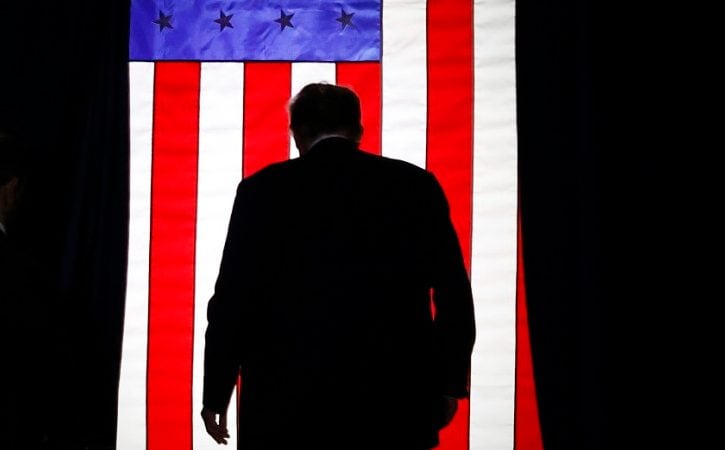
Donald Trump
A man has been shot in the chest and needs a valve to stop his lungs being crushed. A Russian grenade has shredded the legs of the squad’s best fighter. Two Russian brigades are closing in and they’ve got tanks. The Ukrainian squad has 13 men including the wounded and one improvised anti-tank weapon made of an ordinary mortar round, bolted to a rocket. Their request for drone support has been refused.
“Give me a rifle and f— off,” mutters the man with the bloodied legs from the floor of the trench.
“He says give him a rifle and f— off,” the medic relays to the commander.
“There’s nowhere to f— off to,” replies the commander. “Get ready for a fight.”
In the end, they came through – saved by the inexperience of the Russian infantry and the timely arrival of a pair of Bradley fighting vehicles.
But this lucky escape on the outskirts of Avdiivka, about 500 miles south-east of Kyiv, powerfully illustrates the imbalance of force on Ukraine’s battlefield that is being exacerbated by delayed American military aid.
Weeks after this fight, a Republican decision to block a $60 billion US aid package in Congress led directly to the fall of Avdiivka.
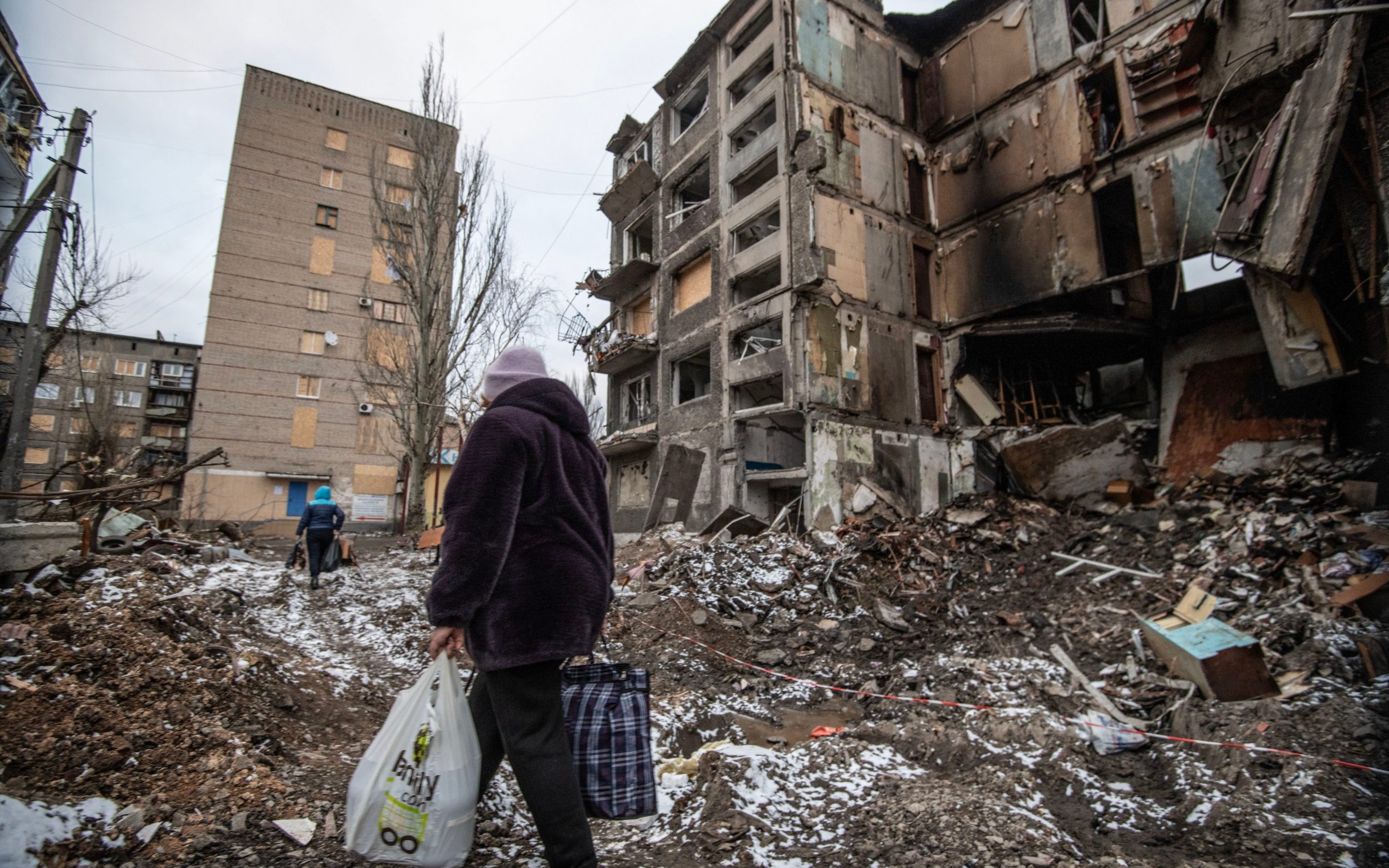
An apartment block is destroyed by a Russian missile when Avdiivka fell in February, 2024 – Julian Simmonds
Now, nearly two months after that defeat, the aid package is still blocked and the Russians are still advancing. Ukraine has lost territory it would “undoubtedly have retained” with “a sufficient number of air defence systems and artillery shells,” Colonel General Oleksandr Syrsky, Ukraine’s military chief, said last week.
Yet Avdiivka is not just a warning to Ukraine. For European nations, and many other countries around the world, so long used to shielding under the umbrella of American power, the story of Avdiivka should ring alarm bells. Even more so, after the Kremlin warned this week that relations between Russia and Nato countries “have now slipped to the level of direct confrontation”, and Emmanuel Macron revealed a “bizarre and threatening” phone call between Moscow’s defence minister and his Parisian counterpart.
Because Pax Americana – that is, the concept of post Second World War global stability overseen by a hugely powerful United States – is under threat. Its end would represent a revolution in global affairs. And like so many revolutions in modern politics, change rests with the potential second presidential term of Donald Trump.
Mr Trump has vowed to stop the war in Ukraine “in one day”. The former president has given few specifics about how he would do so, but Viktor Orban, Prime Minister of Hungary, said last month [March] that Mr Trump had told him that he planned cut aid to Ukraine entirely – something that would lead to a Russian victory and directly opposes the stated security interests of America’s closest allies – including Britain.
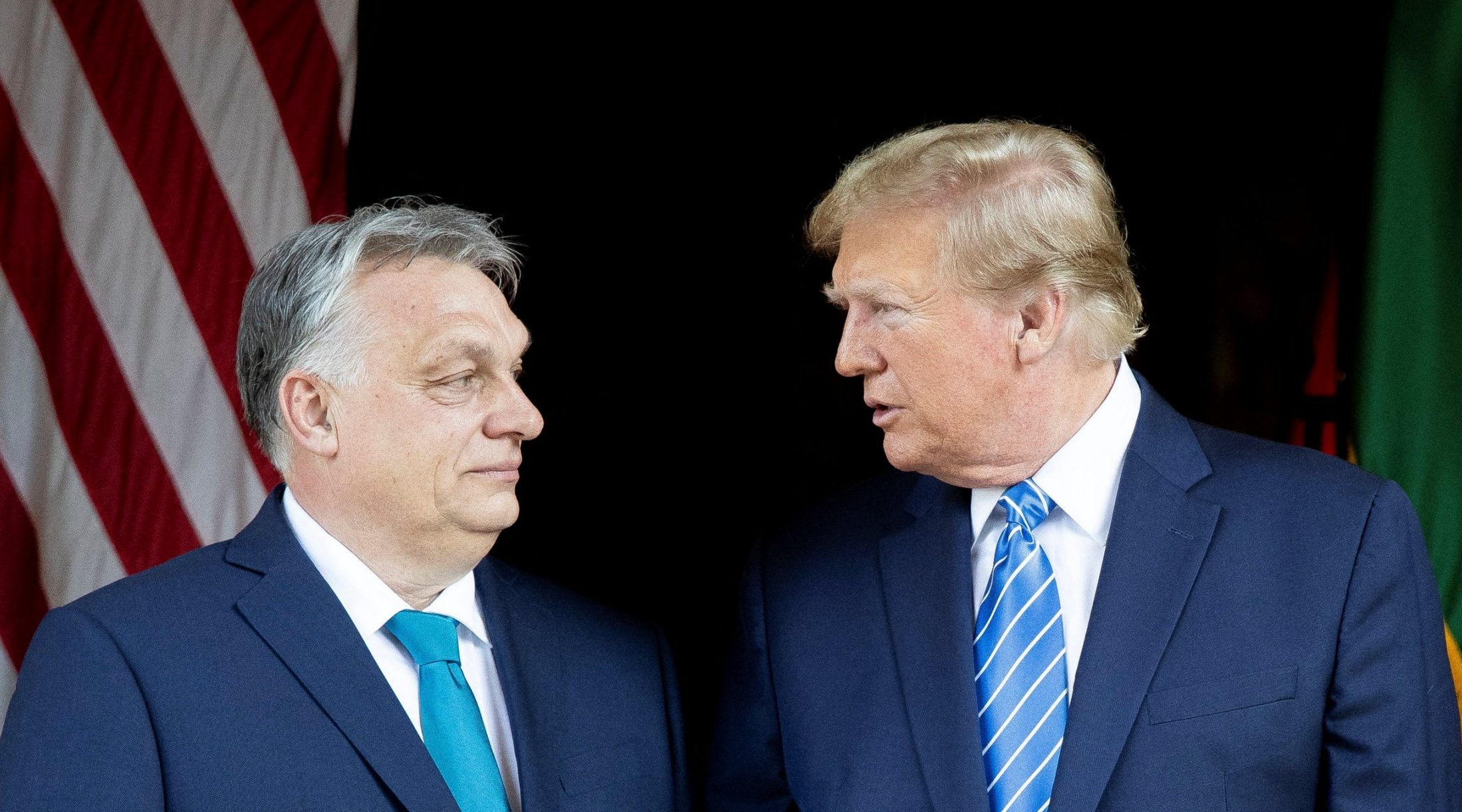
Prime Minister of Hungary Viktor Orban says that Trump told him he would cut off aid from Ukraine entirely – AFP
That prospect is forcing a reassessment of one of the fundamental assumptions of security planning since 1945. From Canberra and Seoul to London and Paris, security thinkers are asking whether the United States is still a reliable ally. Is any country that built its strategic security after 1945 around American power safe? Or are we suddenly on our own?
“You would have to be pretty foolish not to ask the question,” says Richard Haass, president emeritus of the Washington-based Council on Foreign Relations. As a veteran US diplomat, he has advised four presidents.
“America is going through one of those cyclical periods of isolationism,” Haass continues. “It’s like a recessive gene – it’s always been there and sometimes it comes back. What is different about this debate is that it has hijacked one of the two main parties and it’s not just about neo-isolationism – it’s also filled with a kind of romance about authoritarians.”
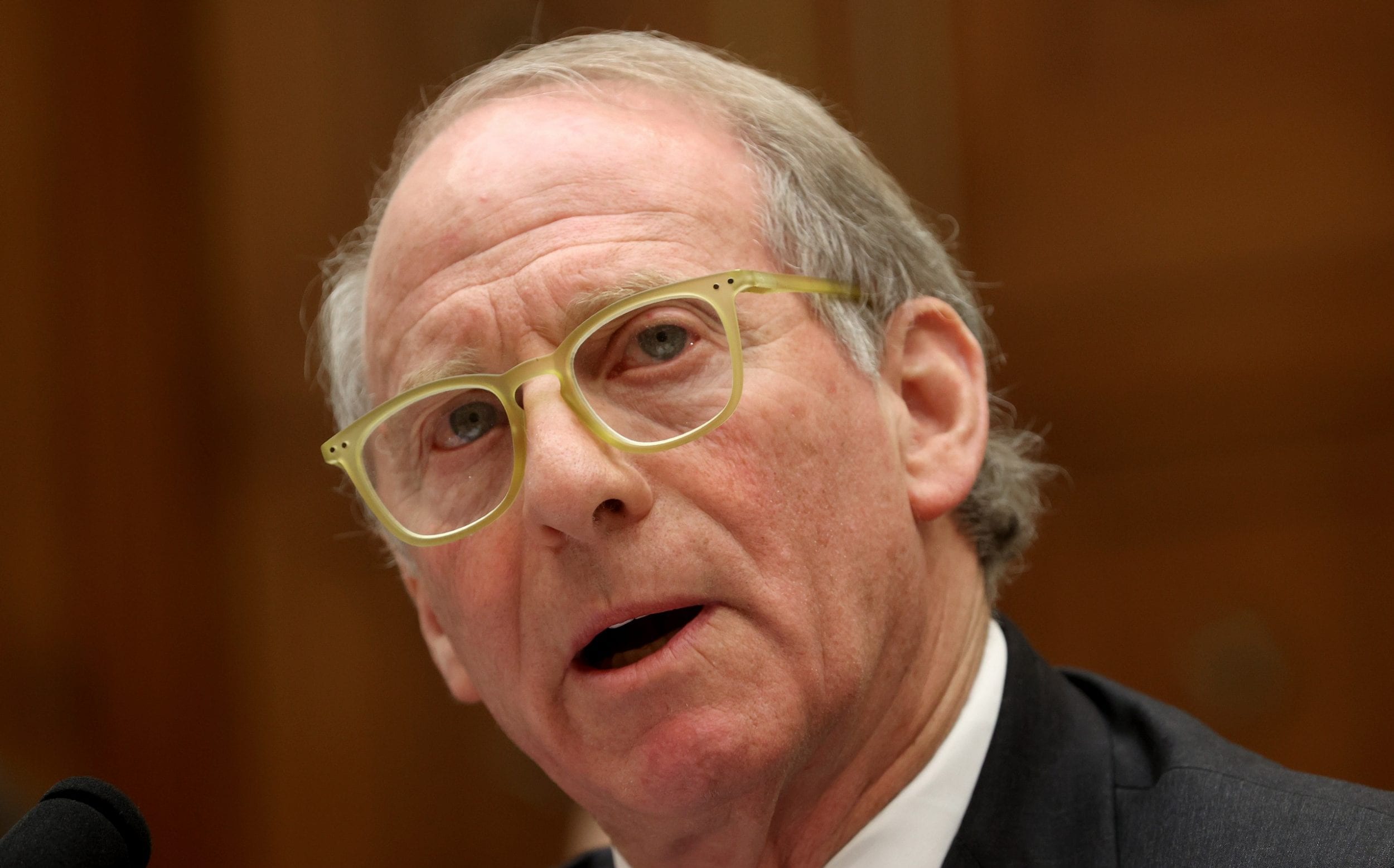
Richard Haass, pictured in 2020 at the Foreign Affairs Committee, says ‘America is going through one of those cyclical periods of isolationism’ – Getty
“If I was advising US allies I’d say they should definitely have a document, a policy in a glass case that says ‘break glass in emergency.’”
Pax Americana
It is difficult to overstate the role of America in European and global security.
This week sees the 75th anniversary of Nato.
Since 1945 Britain, Western Europe, Australia and New Zealand, Japan, the Philippines, and South Korea have built their security arrangements around mutual defence pacts with the US.
Several of these allies – notably European Nato members; Japan, South Korea and Australia – shelter directly under what is often called the American “nuclear umbrella,” which aims to deter several countries from building their own bombs.
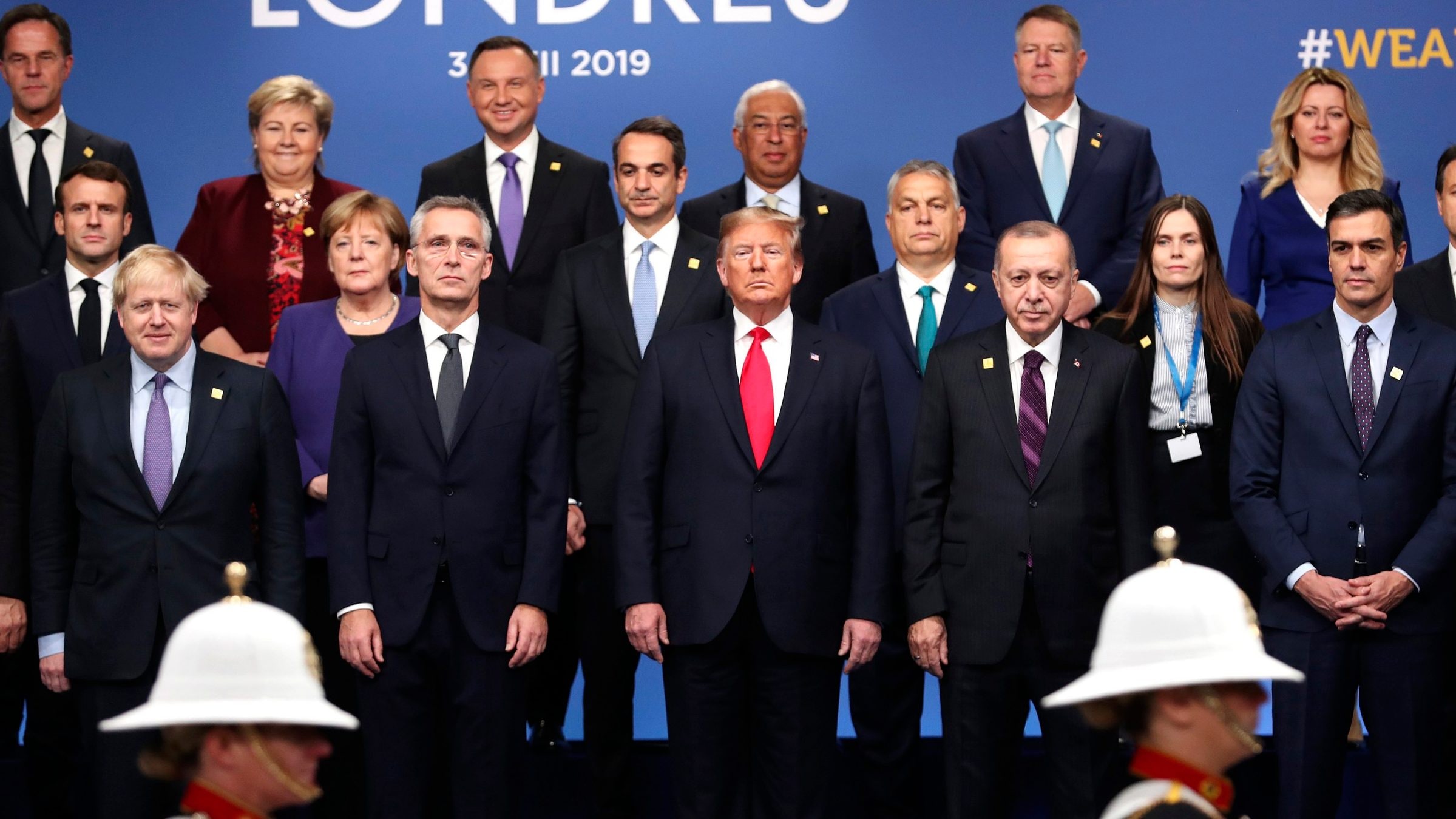
Donald Trump, centre, at a Nato summit in December 2019, Hertfordshire, England – AP
US power is the deterrent meant to stop China from invading Taiwan, or Russia invading Nato members in Eastern Europe (Nato’s defence plan here, essentially, is for regional armies to hold up the Russian advance long enough for America). It is the same power that underwrites both Israeli security and acts as a nuclear deterrent for Arab allies.
If Pax Americana is truly over, the potential consequences are almost too large to comprehend. Except public discussion of this has remained slim.
And yet, says Andriy Zagorodnyuk, a former Ukrainian defence minister, “I know for a fact there is a huge movement of analysis in Europe asking: ‘what will we do if this is the end?’”
“There is a massive intellectual effort to assess, if the US is pulling out, how to preserve peace and stability in this part of the world – or to restore peace and security, if you’re talking about Ukraine.”
“It would be such a catastrophic change,” says Professor Justin Bronk, a senior fellow for airpower at the Royal United Services Institute. “It is difficult to talk about it without sounding like an alarmist lunatic.”
“The problem it presents is so vast: where do you begin?”
American Retreat
The immediate impact of an American retreat is already being felt. In US Congress, Speaker Mike Johnson’s refusal – on Donald Trump’s instruction, say senior Western officials – to bring a bill to the US House of Representatives is starving Ukraine of badly needed kit. Above all, they are lacking shells and the artillery barrels to fire them from.
Mr Johnson hinted this week that he may finally bring the bill to a vote on April 9, when US Congress returns from Easter recess. In the meantime, less artillery support to break up Russian attacks will lead to more close-quarters, high-casualty trench fights like the one at Avdiivka.
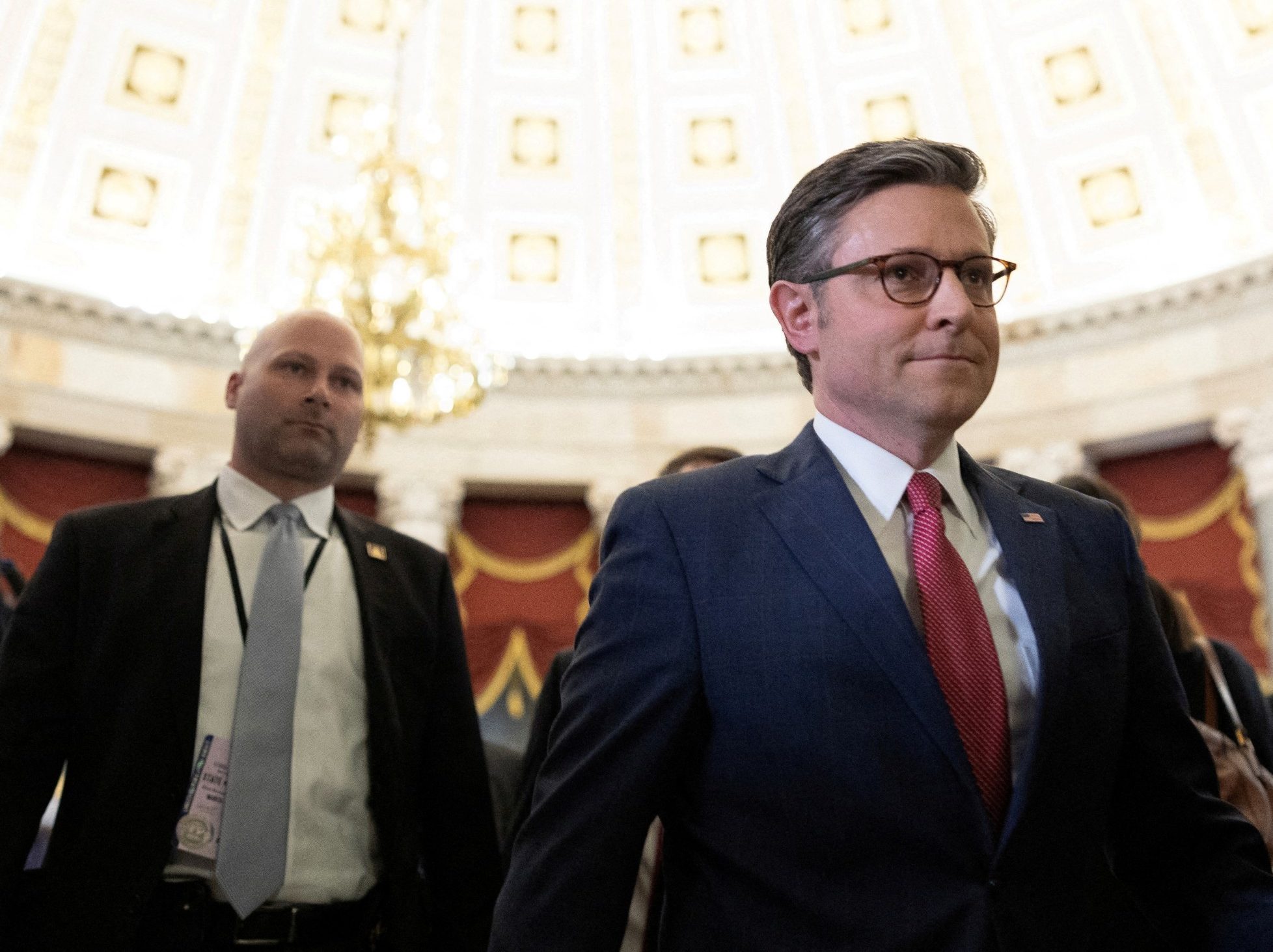
Speaker of the House Mike Johnson has hinted that he may bring forward the bill that would sponsor Ukraine’s artillery – REUTERS
Ukraine will also see more men packed into the trenches, which means more targets for Russian artillery, and with fewer shells, they will have less counter battery fire. Ultimately, it means more dead, more wounded.
That doesn’t mean immediate defeat. The fight described earlier took place in October, a week into Russia’s assault on Avdiivka. It was three more months of unequal fights and heavy Russian losses before the Ukrainians had to give up the town.
Yet tenacity has a breaking point. Unless decisions are made rapidly, some analysts fear the Russians could in the second half of this year achieve a breakthrough similar to the Ukrainian successes of late 2022.
“On the current trajectory, the result of this is not a stalemate. It is a Russian victory,” says Prof Bronk.
Defeat
The potential consequences of such a victory are immense. Europe would be flooded with up to 15 million refugees and Nato’s eastern members would be face-to-face with a massive, experienced and battle-hardened Russian army backed by a booming military-industrial complex.
Boris Pistorius, the German defence minister, warned last month that Russia could attack Nato in five to eight years.
But that prediction is predicated on the war in Ukraine ending so Russia can regroup.
For Donald Tusk, the Prime Minister of Poland, war is “no longer a concept from the past”, as he told the BBC last weekend. “It’s real and it started over two years ago.”
The pressing issue is that American reluctance to back Ukraine could weaken Nato’s security as a whole, particularly given Mr Trump’s comments that non-paying Nato members would “get no protection”.
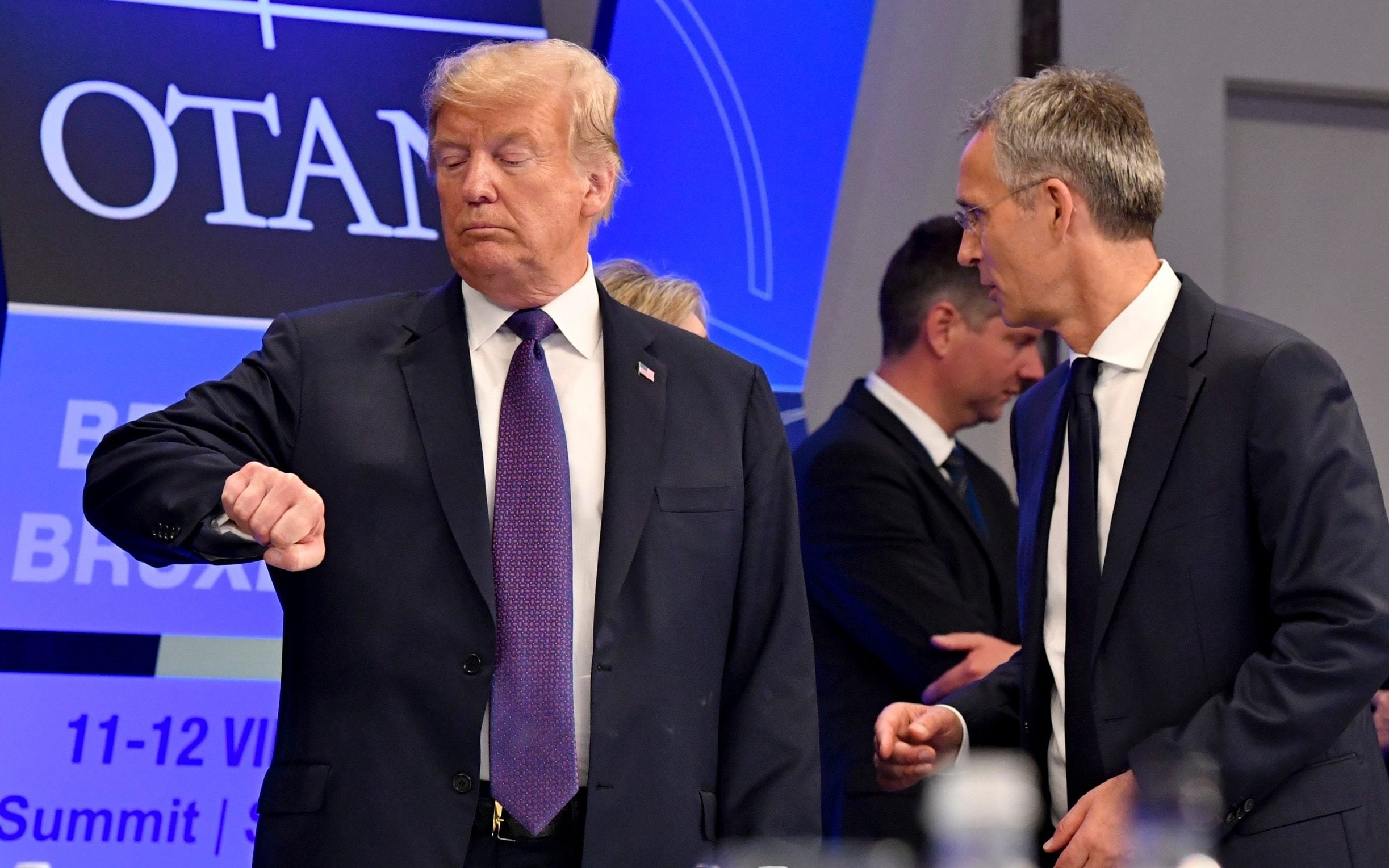
Time’s Up: President Donald Trump at a Nato Summit, 2018 – AP
Contrary to popular belief, Article Five, the mutual defence clause in the North Atlantic Treaty, does not oblige America or any other ally to go to war in defence of another.
It only requires them to consider a response. So any sign that the US is unwilling to back the commitment with force is a potentially fatal hole in its deterrent effect.
“I honestly think a lot of politicians in the West don’t understand what Nato is, and I’m speaking as a former Nato officer,” says Ed Arnold, a research fellow for European Security at RUSI. “Russia could take the whole of Estonia and the US could send an AWACs. It could impose sanctions. It could move an aircraft carrier around in the North Atlantic, and they would live up to the letter if not the spirit of Article Five. Europeans really need to understand that.”
“Donald Trump doesn’t have to leave Nato to destroy it politically. He can just give one press conference saying he is not going to defend it.”
There would also be a knock-on international effect were America to retreat.
The very worst case scenario is a kind of 1945 in reverse: defeat for the West in Ukraine, followed by a move by China on Taiwan that, if not resisted, would deal a body blow to American influence in the Pacific.
Even short of that, the likely takeaway is simply more instability and more conflict.
“People would derive lessons from this. I think adversaries or foes might be more willing to challenge us. I think we would certainly invite more tests or probes by North Korea, Iran, and even China. And I know from my recent travels and conversations that our allies are worried about this,” says Dr Haass.
“If the United States is seen as not so much being unable to do certain things, but unwilling to ensure things, it will be tested by adversaries and friends will suddenly face some extraordinarily difficult decisions,” he added.
Solutions
Dr Haass proposes three cornerstones for US allies to get up to scratch: greater self reliance, finding new security partners, and some form of accommodation with adversaries.
In Europe and the Western Pacific, new security partners means existing Nato members might make more of their own alliances with one another and reach out to like-minded countries elsewhere.
For example, on Wednesday, Nato foreign ministers discussed a plan drafted by Jens Stoletenburg, the Secretary General, for a $100 billion five-year aid plan designed to “Trump-proof” assistance for Ukraine.
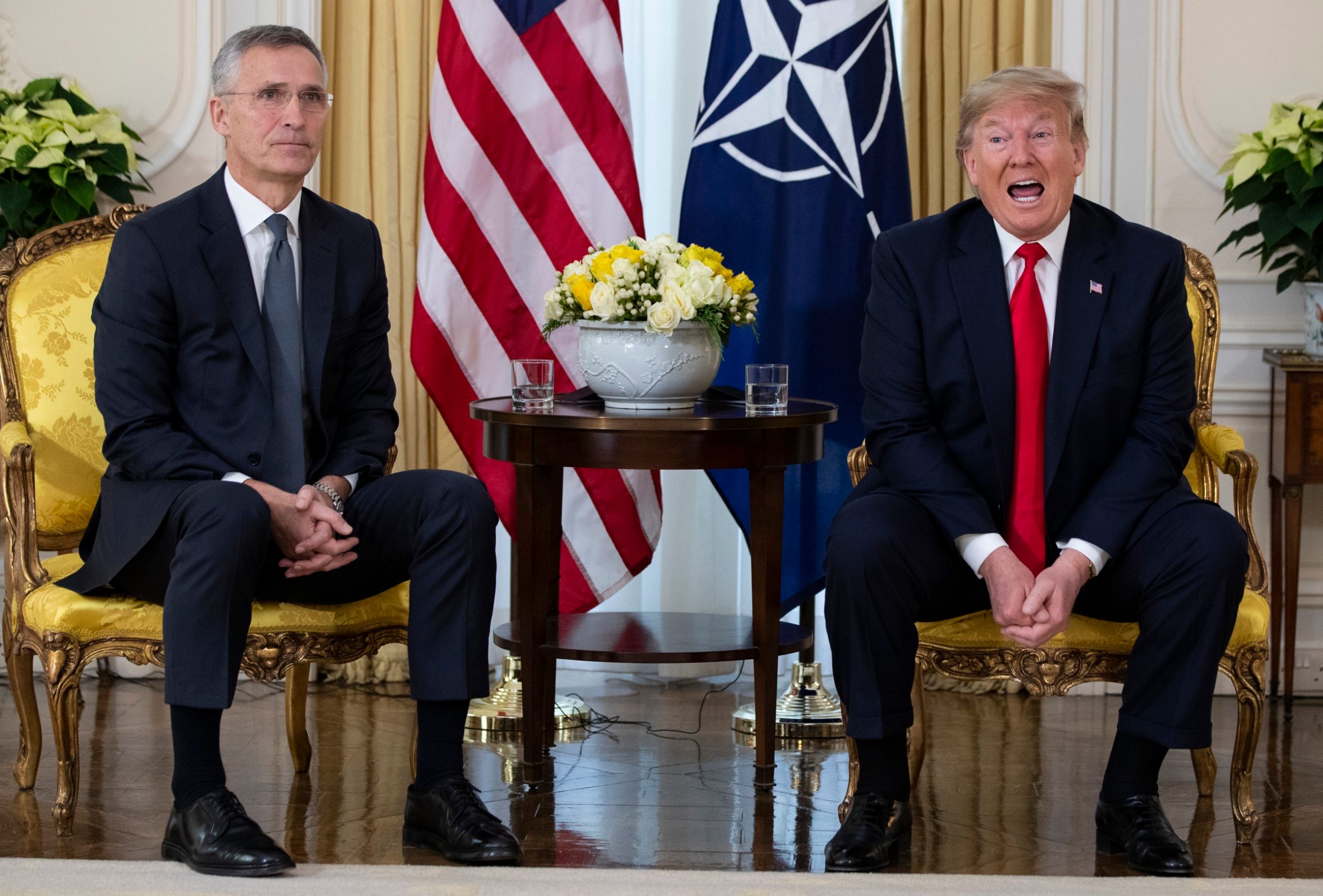
The Nato Secretary General Jens Stoltenberg pictured with Mr Trump in London, 2019 – AP
It would also give Nato – not the United States – control of the Ramstein arms support program started in 2022, according to the Financial Times.
The global security shifts may also force non-aligned countries to pick a side. Some are looking much more favourably towards Moscow or Beijing, whether for ideological reasons, or economic and political self interest, further eroding American influence and the coherence of the Western alliance.
In African countries there’s particular sympathy for the message pushed by Moscow “that this is a structural reforming of world events. We are the vanguard and we want your support because we’re taking on Western colonialism,” points out Mr Arnold.
Russia is already pumping military, political, and economic capital into relationships on the continent.
In the Pacific, a potential American retreat may prompt a rethink about which great power it is more prudent to please in the event of a Chinese attack on Taiwan, says Professor Bronk. He mentions Vietnam, Singapore, and the Philippines as possible examples.
Rearming
Greater military self-reliance, most people agree, would be a good thing. But equally, there is consensus that a world in which multiple countries simultaneously arm themselves to the teeth is not a safer one, especially when it comes to nuclear weapons.
This winter even saw a brief – until now unthinkable – public debate in Germany about Berlin acquiring the bomb.
“You’ve already got a heated debate in South Korea,” warned Dr Haass. “[If] the United States is not there in Ukraine and then someone like Donald Trump is elected, he would potentially pull US forces off the Korean peninsula. I would be surprised if the debate in South Korea about acquiring nuclear weapons did not move to the front of the queue in national security decisions. Even in Japan such a debate could arise.
“In the Middle East, if Iran continues to move towards a nuclear capability and the United States is seen as pulling back even more from the region, then I think it’s inevitable that the Saudis or the Egyptians of the Turks or others would say ‘Ok, how do we look out for ourselves because we don’t want to accommodate much less appease.”
So, American retreat is likely to signal not fewer weapons but the reverse – a proliferation of new alliances, where nations are more likely to be forced into pragmatic concessions with aggressive neighbours, and dozens of heavily armed states could race for the bomb.
It is a grim picture. But while defence and foreign policy intellectuals are ringing every alarm bell they can reach, Western governments seem strangely reluctant to take the danger seriously.
“The problem that I think we’re having at the moment is that there is still that caucus out there who actually believe it will be alright on the night because Joe Biden will win,” says Mr Arnold.
“That is actually the real risk – that we don’t start to get serious about this stuff until the second week in November. And that is what I am picking up – that there is very little in Europe at the moment, government-to-government closed meetings saying: ‘How do we manage this eventuality?’”
The positive Trump affect
Officials in allied governments who may have to work with a second Trump administration are wary of voicing criticism in public – or, indeed, in private. Ukrainian, British, and European officials voice three mitigating arguments to counter doom mongering about the possible end of Pax Americana.
The first is that Mr Trump’s rhetoric about Nato allies who do not pay their own way may be fiery, but reflects nothing more than a long-standing and bi-partisan US frustration with Europe which is, many admit, perfectly justified.
There is a case to be made that his bad cop act was more effective in persuading allies to increase spending – and thus strengthening Nato – than politer criticism.
The same goes for the consensus in Washington that China, rather than Russia, is the greater systemic challenge that the US needs to focus on. Europe will end up shouldering more of the security burden for the Atlantic Basin regardless of who wins in November.
Second, they say, Mr Trump’s foreign policy record is hardly one of timidity.
In 2017 he was the first US president to supply Ukraine with meaningful military supplies when he approved the sale of Javelin anti-tank weapons.
In 2018, he bombed Syrian government forces in retaliation for a suspected chemical weapons attack – enforcing a red line that Mr Obama infamously drew, then abandoned. He also robustly challenged Iran, authorising the controversial strike that killed IRGC commander Qassem Soleimani.
Thirdly, they say, his unpredictability might be annoying, but it also makes it more difficult for adversaries to anticipate and manipulate US intentions.
After all, Vladimir Putin himself told Russian media in February that Joe Biden would be the better choice for Russia – his traditional leadership style making him easier to deal with.
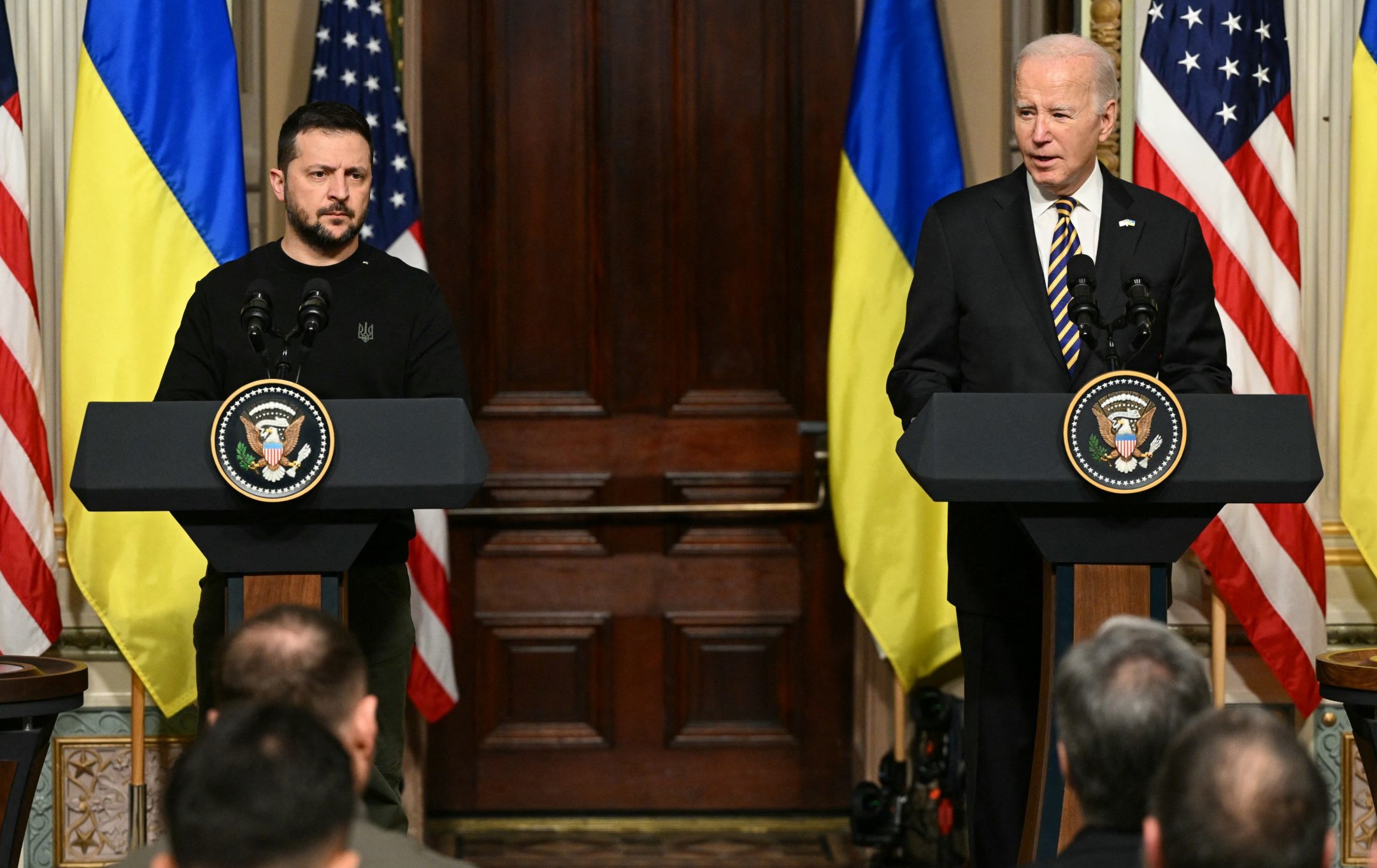
Ukraine’s leader Volodymyr Zelensky meets with US President Joe Biden in Dec 2023, whom Vladimir Putin has named as a preferred presidential candidate – AFP
Look at it this way, officials say: Donald Trump thinks in terms of strength and weakness. He doesn’t like America to look weak or like it has been beaten. And that’s not necessarily a bad thing for American allies.
Those soothing words brush over the surprising but very marked shift in domestic American politics, warns Dr Haass. “I’m uncomfortable with predictions,” he says. “But we’re at a really important moment in history. Three-quarters of a century after the end of World War Two, and roughly three-and-a-half decades after the end of the Cold War, I feel that the debate in this country is putting in motion some big questions for the global order.”
He points to many reasons for this moment: the rise of Donald Trump, the polarising effects of social media, the failure of successive governments to address domestic issues, poor history teaching in schools, lack of a military draft, and above all 75 years without a great power conflict.
The result is that American public debate has shifted in a way that has taken America’s allies – and many Americans themselves – by surprise. The public takes peace for granted. “To some extent we are paying the price for our own success. In several generations now we have not had to deal with certain types of situations, or only very narrow slices of generations have had to deal with them since we’ve eliminated the draft. And so increasingly America is just in a very different place psychologically,” says Dr Haass.
In other words, Trumpism will not die with Trump, argues Mr Arnold, and betting British security on 300,000 swing voters every four years is not a viable long term policy.
“Trump is unpredictable. As military people say, hope cannot be part of the strategy. We have to understand there is a risk and we need to be ready for this risk,” says Mr Zagorodnyuk.
“And as such we need to understand what we are going to do to be self-sufficient. And it is actually possible. It is difficult but it is possible, especially with this massive technical transformation of the landscape of the world. ”
What is to be done?
Collectively, European countries including Britain are now supplying more hardware to the Ukrainians than the United States, and they are taking steps to expand production.
The Czech Republic is leading an initiative to buy up to 1.5 million shells on the international market. The first rounds should reach the front by June. Petr Pavel, the Czech president, said in March that he expects European arms companies to soon produce enough rounds for both Europe and Ukraine.
If agreement can be reached on Mr Stoltenberg’s “mission for Ukraine” proposal at Nato’s 75th anniversary summit in Washington in July, it could lock in aid for Ukraine before any potential return for Mr Trump to the White House.
But plugging the gap left by the United States will be hard. Some items – like M777 Howitzer barrels and spare parts for Bradleys – are made exclusively in the United States. No one else has quite the same capabilities in intelligence, logistics, and economies of scale.
In the longer term, none of Europe’s three biggest military powers – Britain, France and Germany – are currently in a position independently to generate anything like the conventional weaponry needed for a second echelon force to reinforce the Baltics in case of a Russian invasion.
To do so will require not only investment in hardware, but man power. It will require governments to be honest with the public about why young people should serve – and possibly fight and die.
Ultimately, says Mr Arnold, it means talking about the social contract between state, public, and armed forces in a way that has not been done in decades – possibly since the Beveridge Report of 1942.
Chief of the General Staff Gen Patrick Saunders’s comments in January that a land war would be a “whole of nation undertaking” appear as an attempt to start that debate.
There will also, inevitably, need to be discussion about non-conventional defence. In this part of the world, that probably means the British and French nuclear deterrents playing a greater role in European security.
Yet few politicians are willing to publicly make the case for increased spending.
In Britain, Government insiders agree Britain will have to spend a lot more on defence and expanding its military industrial base.
Grant Shapps, the Defence Secretary, delivered a speech in January warning that we are moving from “a post-war to a pre-war world.” This week, he warned in an article for The Telegraph that Nato countries that failed to spend two per cent of GDP on defence were playing “Russian roulette” with the West’s future.
Yet Jeremy Hunt, the Chancellor, cut rather than expanded defence spending in the 2024 budget last month.
The justification seems to be that you need to return to growth before you can make big investments.
That does not impress defence experts, however.
“The current prime minister – his five priorities don’t include defence and security. The leader of the opposition has five missions – none of them are defence and security,” noted Mr Arnold. “There’s an election here and quite frankly there’s other things to consider from their point of view.”
Professor Bronk is less kind: he uses words like “mad,” “insane”, and “irresponsible” to describe the Budget.
This week Labour and Conservative MPs signed an open letter to both party’s leaders calling for defence spending to be raised to 2.5 percent of GDP in the next parliament.
But it’s not a peculiarly British problem.
The Germans spend more on aid to Ukraine than any other country after the United States and have promised big investments in defence since Olaf Sholz’s 2022 landmark Zeitenwende speech, in which he pledged a historic shift in Germany’s historically cautious defence policy in recognition of the new threat from Russia. But they are still loath to do anything without a US lead, says Mr Arnold.
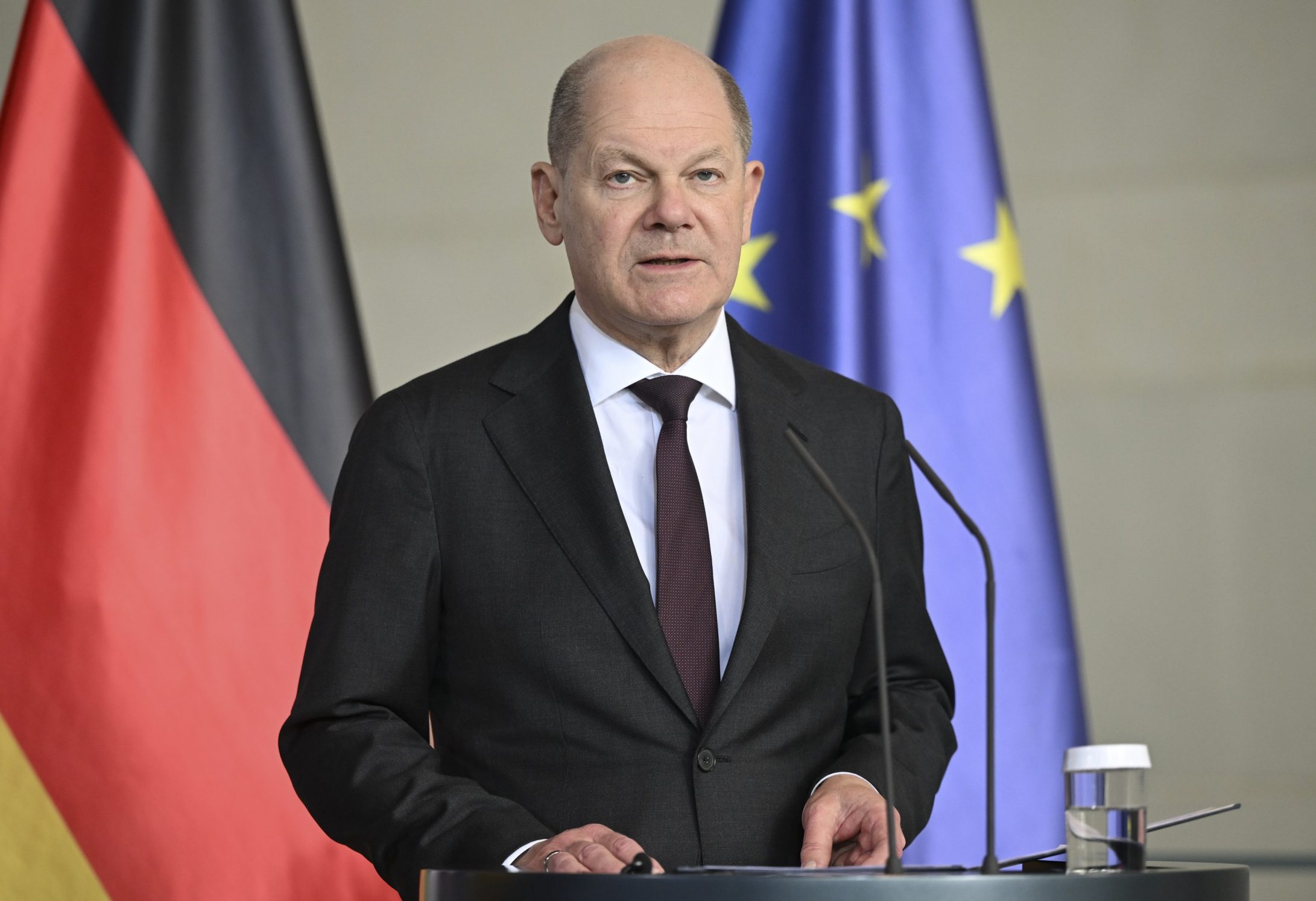
German Chancellor Olaf Scholz has pledged to spend more on defence with a new threat from Russia – Anadolu
“Their strategy is pretty much an ostrich strategy – they’ve pegged everything to the US for so long, they can’t even comprehend a second Trump presidency and what that will do,” says Mr Arnold.
France’s president Macron has spoken extensively about alternative security arrangements, but faces domestic challenges and annoys allies by saying more than he does.
France is a relatively modest contributor of military aid to Ukraine, and Macron’s government has also repeatedly blocked European Union plans to replenish Ukraine’s dwindling artillery shell stocks. Instead, they’ve demanded munitions be manufactured inside the bloc – a bizarre act of business-as-usualism for someone alert to a profound shift in global security.
The lack of urgency is immensely frustrating, says Mr Arnold, precisely because it is manageable.
“There’s two ways to look at this. We can either approach it in a positive, ‘let’s do something about this and recognise the problem’ way, or we don’t and we look at it in a very pessimistic, doom-and-gloom, what’s-the point-way,” says Mr Arnold. “But I don’t think you’re getting the sense of how dramatic this could be.”
The sharp end
Perhaps policy makers could draw lessons from those at the sharp end of the crisis.
The trench fight outside Avdiivka “turned into a disaster in four hours of fighting,” Max, one of the survivors, told me. His squad was outnumbered, outgunned, and certain to be overrun.
“After the second tank passed I understood, that’s it, they will just smash us into the ground, so I just placed my AK magazine in the ground and started shooting semi-auto,” he recalled.
And yet the footage taken on his and other soldiers’ body cams is remarkable for the calmness of all involved. He still doesn’t put much stock in warnings of imminent disaster at the front.
“The further you get from the front, the more hysteria you encounter,” he reflects.
“Maybe disaster can be averted, provided we don’t freeze at the scale of the task.”
Sign up to the Front Page newsletter for free: Your essential guide to the day’s agenda from The Telegraph – direct to your inbox seven days a week.
News Related-
Antoine Dupont still hurt by 'injustice' of World Cup loss to Springboks
-
China's New Aircraft Carrier Begins Catapult Testing
-
Aircraft Downed Inside Russia By Patriot System: Ukrainian Air Force
-
“Am I Prog’s Taylor Swift? That’s a debate that could run and run”: why Peter Hammill re-recorded his Enigma-era albums
-
Car With Pro-Russian Fighters Blown Up by Resistance: Exiled Mayor
-
Europe and African nations must find effective common ground in dealing with migration influx
-
Springbok lock opts not to renew contract with URC team
-
Pravin Gordhan’s deathly legacy: A threat to SA’s economic future
-
Antoine Dupont STILL hurt by ‘injustice’ of Rugby World Cup loss to Springboks
-
Rubber stamping NHI Bill will have damaging consequences for SA for generations
-
Inside horrific conditions Hamas hostages suffered including losing 15lbs in 50 days
-
After the Bell: SA’s NHI healthcare disaster starts right here
-
Gupta-linked development land for sale
-
Gary Neville begrudgingly claims brilliant Man Utd midfielder ‘looked like a Man City player’ in Everton mauling
